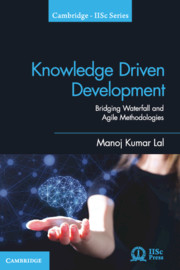Book contents
- Frontmatter
- Dedication
- Contents
- Figures
- Tables
- Foreword
- Preface
- Acknowledgements
- Overview of the Book
- 1 Knowledge Driven Development: What is the Proposition?
- 2 Project Delivery and Supporting Methodologies
- 3 Project Delivery Pain Areas and the Way Forward
- 4 Project Knowledge Model: Context and Definition
- 5 Project Knowledge Model: A Differentiator
- 6 Project Knowledge Model vs Project Documents
- 7 Extending Project Knowledge Model to Cover End-to-End Project Delivery – KDD
- 8 Extended KDD: Pre-Requirement and Post Delivery
- 9 KDD Compliance with Standards of Project Delivery
- 10 Enabling DevOps
- 11 Addressing Contemporary Concerns of Project Delivery
- 12 Helping Existing Methodologies
- 13 Technology Enablers: Tools and Automation
- 14 Suits Factory Model: Needs Cultural Change
- 15 Global Relevance of KDD: GKMF Assisting Skill Development
- 16 Lean KDD: Elimination of Requirement and Test Design?
- 17 Conclusion
- Appendix A Illustrative Non-Functional Attributes
- Appendix B Compliance of PKM with GKMF
- Appendix C Project Estimate and Business Rule/Scenario Framework
- Appendix D Inventory Relationship for Setting up of Security Questions – as per Example in Chapter 6
- Appendix E KDD: Response to Criticism
- Glossary
- References
- Index
6 - Project Knowledge Model vs Project Documents
Published online by Cambridge University Press: 20 October 2018
- Frontmatter
- Dedication
- Contents
- Figures
- Tables
- Foreword
- Preface
- Acknowledgements
- Overview of the Book
- 1 Knowledge Driven Development: What is the Proposition?
- 2 Project Delivery and Supporting Methodologies
- 3 Project Delivery Pain Areas and the Way Forward
- 4 Project Knowledge Model: Context and Definition
- 5 Project Knowledge Model: A Differentiator
- 6 Project Knowledge Model vs Project Documents
- 7 Extending Project Knowledge Model to Cover End-to-End Project Delivery – KDD
- 8 Extended KDD: Pre-Requirement and Post Delivery
- 9 KDD Compliance with Standards of Project Delivery
- 10 Enabling DevOps
- 11 Addressing Contemporary Concerns of Project Delivery
- 12 Helping Existing Methodologies
- 13 Technology Enablers: Tools and Automation
- 14 Suits Factory Model: Needs Cultural Change
- 15 Global Relevance of KDD: GKMF Assisting Skill Development
- 16 Lean KDD: Elimination of Requirement and Test Design?
- 17 Conclusion
- Appendix A Illustrative Non-Functional Attributes
- Appendix B Compliance of PKM with GKMF
- Appendix C Project Estimate and Business Rule/Scenario Framework
- Appendix D Inventory Relationship for Setting up of Security Questions – as per Example in Chapter 6
- Appendix E KDD: Response to Criticism
- Glossary
- References
- Index
Summary
Although this topic is touched upon in the previous chapters, this chapter concentrates on comparing PKM against project documents with respect to the creation and maintenance of project knowledge. It introduces both the mechanisms and provides an exhaustive comparison of the two from different perspectives. An example is provided for both document extract and PKM extract to aid understanding of their differences. It also details the artefact sets that can be extracted from PKM.
Project Knowledge Model and Project Documents
Figure 6.1 depicts how knowledge is managed in a typical project delivery from the perspectives of PKM and document production regime. Document production regime is based on Waterfall (structured) methodology. Agile methodology have a sleeker version of the document production regime.
Any methodology of software development starts from gathering requirements and ends with the working software and the related specifications of the software. The traditional methodologies have been relying on document production regime for capturing specifications of the software from solution, technical and test perspective. In the Waterfall methodology, emphasis is given on rigorous maintenance of the documents during different phases of the project delivery. Agile methodology go for ‘fit-for-purpose’ documentation and documents are kept at high level so that they do not need frequent changes.
As mentioned earlier, keeping the documents updated in real-time is a challenging task in project delivery and that causes a lot of gaps in communication, ultimately delaying the project. This is one reason the Agile methodology only go for high level documentation that does not need frequent updates.
The main issue with the document production regime is that there is a need to update the contents of the documents regularly as the project progresses through different phases. But the problem is the before the updated document can be issued, it needs to be approved by the relevant stakeholders. The revised version of the documents is mostly issued on reaching selected milestones. For example, in Figure 6.1, six versions of BRS (Business Requirement Specification) are visualised over the course of the project delivery lifecycle. Let us say there is a gap of two months before the next version of the BRS is scheduled to be released. From the couple of days of release of the last version, the information contained in the document may not be the latest.
Information
- Type
- Chapter
- Information
- Knowledge Driven DevelopmentBridging Waterfall and Agile Methodologies, pp. 121 - 139Publisher: Cambridge University PressPrint publication year: 2018
Accessibility standard: Unknown
Why this information is here
This section outlines the accessibility features of this content - including support for screen readers, full keyboard navigation and high-contrast display options. This may not be relevant for you.Accessibility Information
- 1
- Cited by
